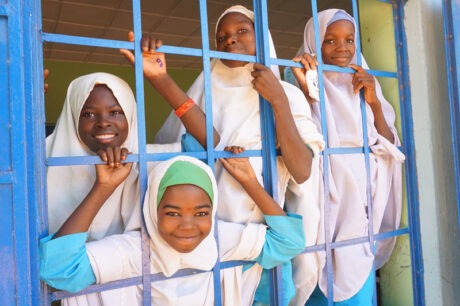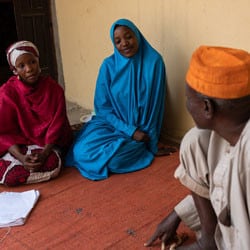In Northern Nigeria, mobilizing to #StoptheSpread
For more information and updates about Creative and our programs’ response to COVID-19, click here.
As the coronavirus crisis began to sweep across the world, the pandemic loomed over Nigeria. By mid-March, the country had only a handful of confirmed cases but was bracing for an outbreak, which would pose a uniquely dangerous threat to the conflict-affected states in the Northeast.
Leaders of a U.S. Agency for International Development Office of Transition Initiatives program that is designed for rapid assessment and response to opportunities for stabilization saw a need for additional prevention measures. The program, which has established and built upon strong relationships with the state governments in the region, was well-positioned to provide support.
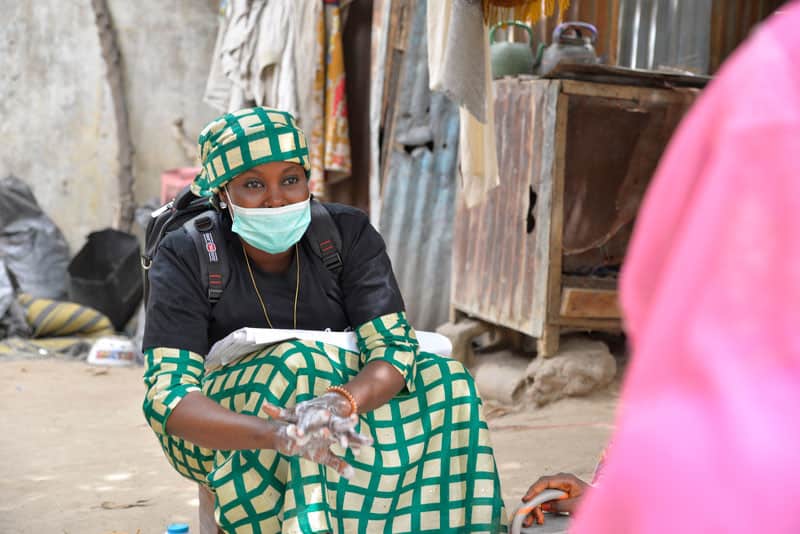
By mid-March, OTI and the Nigeria Lake Chad Basin program (NLCB) had engaged government ministries to identify gaps in coronavirus preparation and together agreed that the program should focus on awareness and prevention to try to stave off an outbreak.
But they knew that time, weak public health systems and lack of confidence among residents were not on their side. The state governments were eager to collaborate with the program and take preventative steps but lacked resources. By March 24, the first grants had been cleared and plans were made to mobilize volunteers and a #StoptheSpread media campaign to inform tens of thousands of people about the virus.
“When the COVID-19 pandemic started reaching Nigeria, we immediately discussed how we could leverage our relationships with state governments and community-based groups to help inform the population,” says Chief of Party Olivier Girard. “The NLCB team is used to working at a fast pace and doing work no one else is doing.”
To date, the volunteers have reached more than 55,000 households and nearly 370,000 people in three states and continue to expand their work with local and state governments to prepare communities to prevent the spread of coronavirus.
Door-to-door to build awareness
Through a grant from NLCB, the Yobe State Ministry of Health mobilized 100 trained health volunteers who reached 18,000 households in 10 wards of the state capital of Damaturu during five days. They also put up 12,000 posters and handed out 12,000 fliers with information on COVID-19 symptoms and prevention methods. Volunteers gave demonstrations of proper handwashing and other tips like coughing and sneezing into the inside of your elbow.
Knowledge is health! In #Nigeria, @USAID has been working to share important information about #COVID19 to demonstrate how to #StoptheSpread. On day one of this project over 5,000 people were sensitized from over 700 households. pic.twitter.com/angFWpaIIQ
— Mark Green (@USAIDMarkGreen) April 2, 2020
“We cannot fold our arms and look at this. It is time for everyone to contribute his own effort,” says Bukar Kurama, program manager in Yobe who is overseeing the activities there. “So, we felt we can bridge the gap on the issues of social mobilization and community engagement.”
Bukar says that volunteers found that people had a high level of awareness about COVID-19 in name, but many didn’t know or had misconceptions about how it spreads
“The intervention we have done will change the narrative of so many people and so many communities,” Kurama says.
A similar effort took place in the neighboring state of Borno. The program issued grants to Borno’s Ministry of Health to organize, train and equip 100 volunteers, supervised by 10 volunteer leads, to fan out over the state capital of Maiduguri metropolitan area and the local jurisdiction of Jere. These trained volunteers informed residents about the risks of COVID-19, demonstrated prevention measures, including hand washing.
The Borno team reached more than 11,000 households and 78,000 people, and distributed more than 12,000 bottles of hand soap.
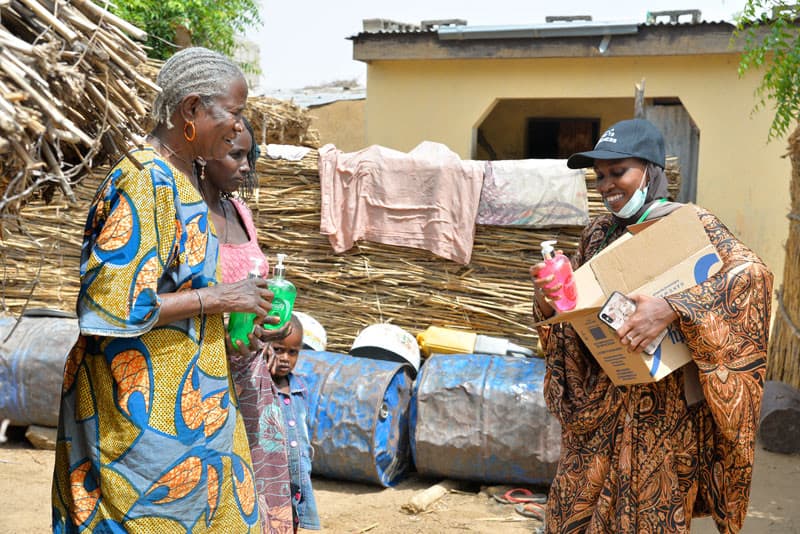
In addition, the NLCB team has deployed 50 additional volunteers in the Borno State Local Government Area of Monguno, who have to date reached 43,000 people in communities and camps for internally displaced persons (IDPs). The program also plans to install PA systems to share messages in Hausa, Kanuri and English.
And in Adamawa State to the south, which borders Cameroon, another 80 volunteers have so far reached more than 18,000 households in the Michika Local Government Area, in coordination with its Primary Health Care Department.
Women as advocates
In Borno, NLCB formed a key partnership with the Ministry of Women Affairs and Social Development, turning to the Borno State Women Led Network to conduct further outreach. The network reached an additional 33,000 people in Borno, including in several IDP camps.
Program Manager Rukayya Jibrin, who is NLCB’s gender specialist in Maiduguri and now oversees the project’s COVID-19 response in Borno, said that just as in peacebuilding, women are key to improving public health.
“As NLCB, we are so happy we could do something very important for the community in this time of need,” she said. “It is important for women to get this information to enable them to protect themselves and their families.”
Women in all three states, with educational materials and soap in hand, are seen taking the lead in sharing crucial information about COVID-19 with their communities.
Through another initiative with the Ministry of Women Affairs and Social Development, NLCB is also organizing tailors to produce non-medical cloth masks to help prevent the spread of the disease. A group of 40 tailors, all of them vulnerable women or widows who previously were involved in NLCB livelihood activities, are being given materials and paid to produce the masks from their own homes. They have so far produced nearly 2,500 and expect to be able to make up to 50,000 in the next few weeks. The masks will be given to the Borno State government’s COVID-19 Emergency Operations Center for distribution to the public.
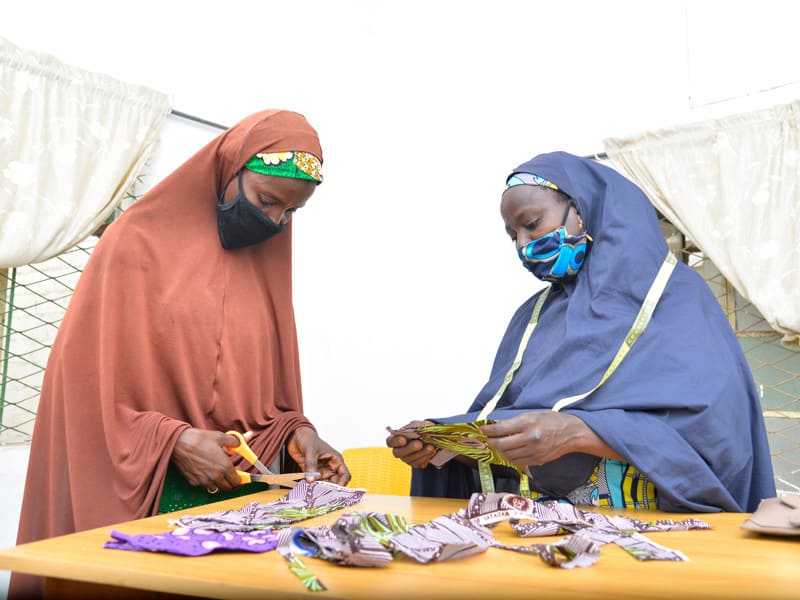
Prevention tips on air and on the streets
In addition to the in-person work, NLCB is collaborating with radio stations and putting up billboards to further spread the word about COVID-19 and how to prevent it.
Yobe Broadcasting Corp., Borno State Radio and station Dandal Kura — which was supported by USAID/OTI to promote peace — are airing public service announcements and jingles about COVID-19 prevention in multiple languages, including English, Hausa, Kanuri and Fulfulde. Stations are also having health experts on as guests and inviting listeners to call in with their questions.
A recent broadcast from Dandal Kura, for example, included a doctor from the Maiduguri Teaching Hospital and officials from the Ministry of Health, the Borno State Police and the disease control office.
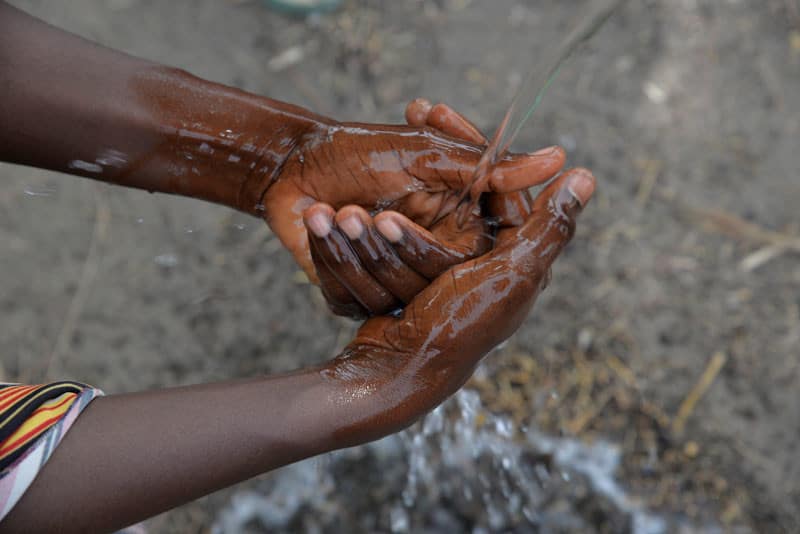
In busy areas near hospitals and markets in Yobe state, six billboards have been put up providing more info about COVID-19, its symptoms, details about social distancing, handwashing and other prevention methods.
More billboards are planned for Adamawa State, where the program is also working on setting up 25 hand-washing stations in strategic locations like markets, malls and motor parks.
Intersection between health and security
As of April 6, Nigeria had fewer than 300 confirmed cases of COVID-19 and five official deaths. But the disease poses a major threat not just as a public health issue but as a potential cause of further destabilization in the Northeast.
Of particular concern are the camps for the 2.4 million internally displaced Nigerians, many of whom have been forced out of their communities because of Boko Haram and ISWA attacks.
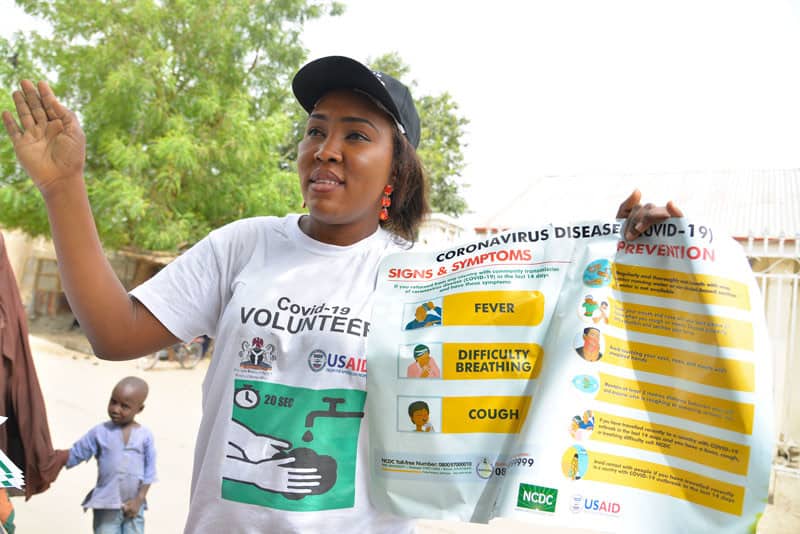
“The spread of the disease in the Northeast, especially if it were to reach the densely populated IDP camps, would be disastrous both from a health and security perspective,” Girard says. “We know insurgent groups are keen to exploit any state vulnerabilities to gain ground.”
As the world weathers the COVID-19 crisis, Girard says the NLCB team will continue working closely with its partners to respond to the quickly evolving situation.
“The challenge is that we know this is just the beginning of the COVID-19 pandemic in Nigeria, and we don’t yet know just how hard it will become for the general population,” he says. “We want to remain relevant, engaged and responsive to our partners while keeping in mind our objective.”
This story was updated on May 4.
